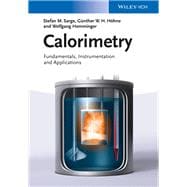Clearly divided into three parts, this practical book begins by dealing with all fundamental aspects of calorimetry. The second part looks at the equipment used and new developments. The third and final section provides measurement guidelines in order to obtain the best results.
The result is optimized knowledge for users of this technique, supplemented with practical tips and tricks.








